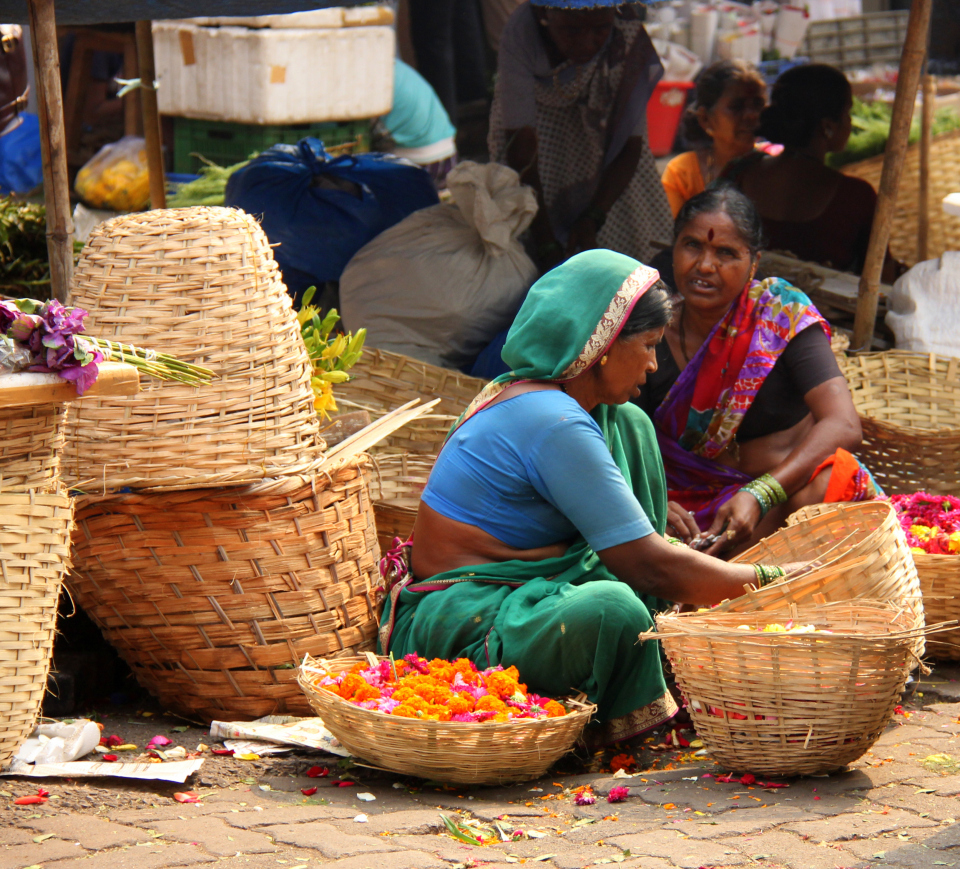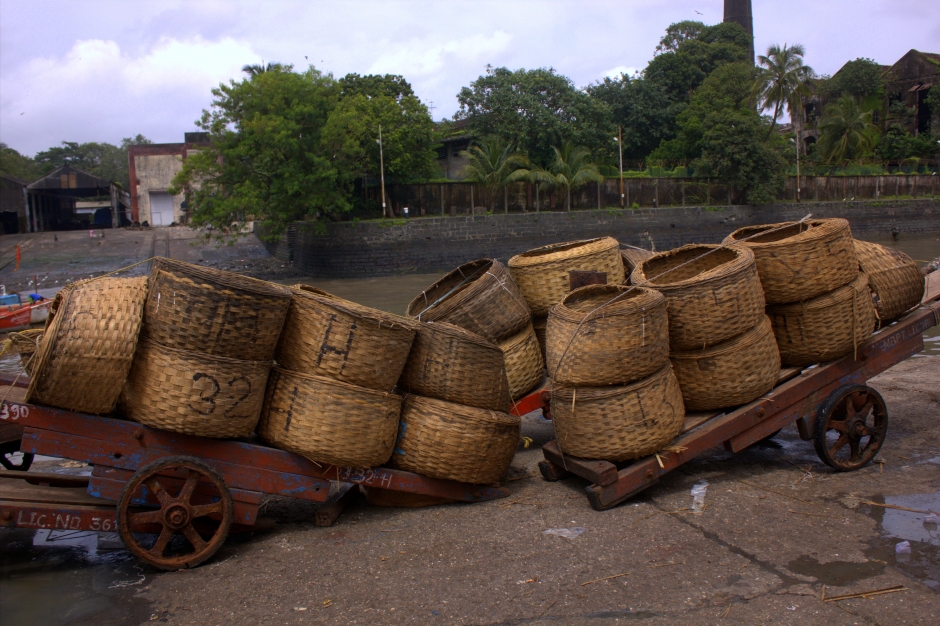Dry Mumbai mornings are always orange and hazy and the city becomes visible after 9. Ongoing construction projects, coastal mugginess and pollution hide the city like naughty djinns and only the late morning sun makes it go away. I have often watched those ochre Mumbai mornings from my luxurious, lofty hide outs and have always marveled at the way the city’s human chaos had spun at dizzying speed, even before its natural elements had woken up.
Dust and vehicular smoke had risen up and darkened the orange haze and the narrow roads of Mumbai had snaked with life. All kinds of cars, motorcycles, auto rickshaws, cycles, hand drawn carts, bullock carts, footsteps and mindsets had filled those traffic choked roads and professionals, school/college kids, bureaucrats, dream weavers, immigrants, hustlers and beggars had pooled into a mega community, who unlike snooty Delhi spoke cordially with each other.
Only tourists and shady characters could barely be found at that time, with the former perhaps watching the unfolding spectacle from some rented space, like me. I had often wondered what drew me to a place, where I had never lasted more than a few days at a stretch and the answer had come to me while watching a play at Mumbai’s iconic Prithvi Theater. A legacy of one of India’s leading theater groups, Prithvi Theater, the venue is one of my favourite spots in Mumbai. Designed and built by architect Ved Segan, it is a charmingly laid back, yet intimate 200 seater stage famous for quality performing arts productions and has an excellent in house cafe which specializes in Irish coffee, melting, gooey brownies and Cutting Chai.
Located in the upscale fancy neighbourhood of Juhu, Prithvi Theater had been named after the group which was founded in 1944 as a traveling troupe by one of India’s most revered showmen of all times, Prithviraj Kapoor. A brilliant artist, acting had been Prithviraj Kapoor’s life and he had formed the troupe at the height of his movie career. His plays had all been in Hindi and had revolved around topical issues with contemporary, thoughtful twists. Even the group’s acting style had been refreshingly different from the prevalent high octane melodrama of commercial theater and the group had delivered thought provoking and grounded to reality, powerful hits after hits. The company had traveled all across India, belting out 2,662 shows in 5,982 days and the great showman had loved art for art’s sake. He had been a strict disciplinarian about his craft and the company had always traveled in 3rd class comfort, including Prithviraj Kapoor, who as nominated Member of Parliament had air travel/1st class entitlements.
The group had performed in mostly cinema halls, giving more expensive theater halls amiss and electric fans were not allowed during performances. Hand fans used to be handed out to every audience member and needless to say, in spite of such stringent rules, people had flocked to watch slices of their reality performed on stage. Audience had lapped up those performances and the group had been extremely popular for its authenticity, which had been based on astute, sensitive observation of their surroundings. Prithvi Theater had run for 16 years, until 1960 when ill health had forced the great man to close down the iconic company. However he had continued to patronize the art by enthusiastically supporting any venture staged by ex members of his group.
There’s a saying that birds of a feather, flock together and this holds true for Prithvi Theater. The gritty, true blue earthy Indian theater had suffered a huge setback with the death of Prithviraj Kapoor and it had only been his son Shashi Kapoor’s foresight to create a Trust in its name, which had saved the heritage from dying out. However, it had been Shashi Kapoor’s wife Jennifer Kendal’s loving and faithful leadership which had given birth to the gem of a venue, called Prithvi Theater. Daughter of actors Geoffrey Kendal and Laura Lidell, ex actors of ENSA (entertainment company for WW II British troops), Jennifer had been a part of her parent’s theater company Shakespeareana, which had toured India since 1940’s.
Shakespeareana had specialized in classics by Shakespeare, Shaw etc as well as contemporary English theater. Jennifer and Shashi’s love story had been a dramatic match made in starry heaven and their marriage had not only bonded 2 great acting traditions, but eventually had given birth to the unique Prithvi Theater. The building which is famous for excellent acoustics, all pervading intimate spacing and charming aura, is no less of a national heritage and keeping in mind, that Bollywood is one of India’s biggest export, Prithvi Theater had been commemorated by the Indian government in a special stamp in 1995, to mark 50 years of the iconic group.
Indian movie industry, like Indian politics is strangely quite hereditary in nature and Prithvi Theater thus reeks of years of good art, sublime aura of excellent taste and aesthetic freedom. I had been introduced to Prithvi Theater by a very dear friend of mine, who incidentally is also a mover and shaker in the same industry. A gregarious, brilliantly creative man, to me he truly represents the soul of Mumbai, its amazing community feeling and (in spite of sporadic unrest and bloody past), its unbelievable communal harmony. India is diverse and Mumbai is the epitome of human diversity. Try stuffing over 20 million Indian Parsis (ancient Iranians), Muslims, Hindus, Christians, Jains, Sikhs, Buddhists, Jews etc with hefty sprinkling of expats from all across the planet in 1 urban space and you will wonder how the city even survives.
A deep natural harbour, Mumbai is the financial hub of India and people flock to it for better prospects. The city crowns India’s western coast and with a topography of a curious mix of blatant on your face display of wealth, like the ugly sky soaring Antilla building with proud spread of teeming Dharavi shanties, Mumbai is nothing short of a miracle. Sometimes the city seems to me absolutely unreal like a mirage, a golden dream which brings surging tides of hopeful immigrants to its rolling shores and the reality is that the city’s origin had indeed been rhetorically invisible.
Created out of 7 islands, Mumbai (those islands actually) had been 16th century Portuguese settlements and a part of dowry to the English ruler Charles II when he had wedded Catherine of Braganza in 1661. Charles II had rented them out to the East India Company in 1668 for 10 pounds of gold a year and by 1845, the quiet idyllic life of the Kolis (local fishermen community) who had lived on those islets for centuries got changed forever. Huge land reclamation projects had forged the islands into a huge landmass thus giving birth to Mumbai out of nothingness.
Mumbai’s invisible history to me is perfectly fitting for a city of dream weavers, dream chasers and eternal optimists. Hopefulness hangs in Mumbai like a tangible aura and somehow the city’s unique joie de vivre had seeped into its proud residents. Adaptable, tenacious and driven, optimistic people of Mumbai work hard and play harder, a fair enough compensation for living in world’s 8th most populous city. It is also known as one of world’s alpha city and shares the crown with other global economic power hubs like Tokyo, New York, London etc. Again the residents thoroughly represent this quality too and from the persuasive tout in Colaba Causeway to the decisive business big shots of Nariman Point, Mumbai is a city of go getters. Incidentally it is also India’s wealthiest urban area and has the highest GDP among the South, West and Central Asian cities.
While all the power play and financial facts and figures had been tempting enough, my strongest attraction to the coastal giant had been my acquaintances and secrets there. People make cities and my Mumbai heartstrings range from various economic and professional backgrounds. Over the years each had shared their slice of Mumbai and had opened my eyes to its kaleidoscope of charms. However it had been my closest and oldest friend who had perfectly worded out Mumbai’s spell on me and coming from him, it could not have gotten more closer to the truth. A cosmopolitan, freedom loving, humble Muslim man, he is one of India’s most popular cine artist and is blunt with his words, generous with his smiles and straight forward in his dealings. We have been friends since 2000 and because of his constant Mumbai companionship, my thoughts about the city are very diluted with his personal observations.
It was him who had explained fine nuances of Islam while walking with me on the pebbly bridge to the floating bubble like Haji Ali Mosque, discussed his sponsored Dahi Handi team’s plan of action during the “see to believe” human pyramidal battle on Krishna Janmashthami and had attended midnight mass with me on Christmas Eve. We have spent many pleasant evenings in Mumbai; marveling at the fragrant bursts of colours at the squalid Dadar station flower market, feasting on wholesome runny seafood curries at Gajalee, staring in awe at the exquisite colonial architectural jewels of the cobble stoned Fort Area and watching fat rain drops splatter noisily on Mumbai’s leafy affluent bylanes.
With acquaintanceship which runs so long back, it is understandable that he had been aware of my Mumbai strangeness and had been able to keenly give it a name. Thus it had been during a power packed performance of “Othello” at the Prithvi Theater, that he had turned to me and worded, “This is Mumbai for you, Mumbai is your Othello“. For those who are familiar with Shakespeare’s great tragic hero, Othello, would exactly know why the 2 have been compared and would understand the city’s palpable magnetic charm. A powerful, Moorish warrior, Othello had been possessed and possessed Desdemona with every living particle of his self and it had ultimately lead to the pair’s downfall.
While as a woman, I carry the tag of “over thinking a situation”:, but come to think of it, Mumbai could easily be personified as my toxic lover. I am always appalled by its traffic, frenzied pace and squalor, and flee from it every time with a sigh of relief, only to return for that hit of mythical gold dusted high. From looking down from a luxe highrise upon the frothing Arabian Sea circling the glittering Queen’s Necklace, stealing quiet moments in our quaint Lokhandwala Bungalow‘s leafy private oasis or going for early morning walks with my taxi driver friend and adopted, fiercely protective brother, along Dadar and Lower Parel‘s commercial sections, my Mumbai’s high is here to stay.
RESPONSIBLE TRAVELING-BECAUSE I CARE
Some photos have been taken from the internet.



























